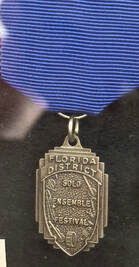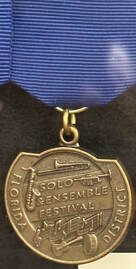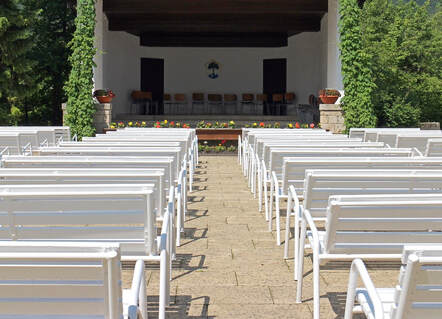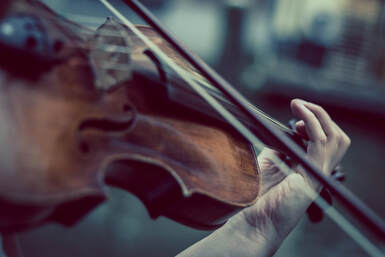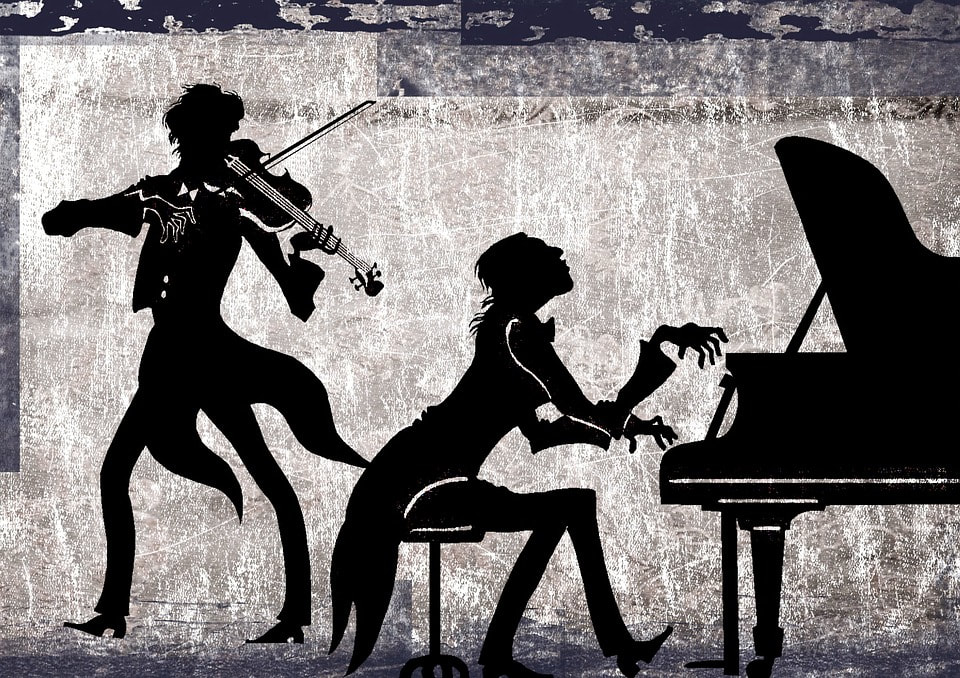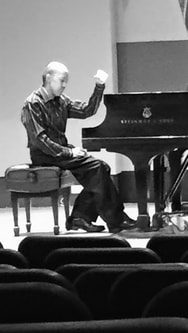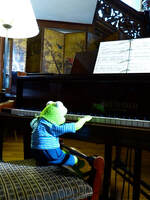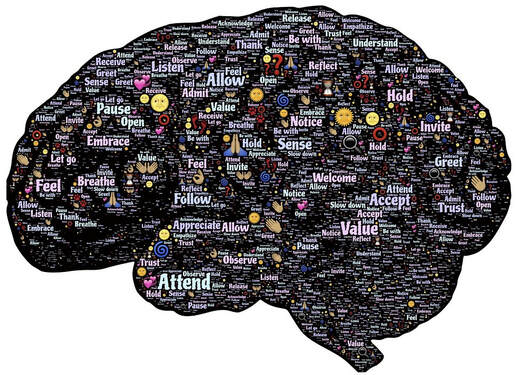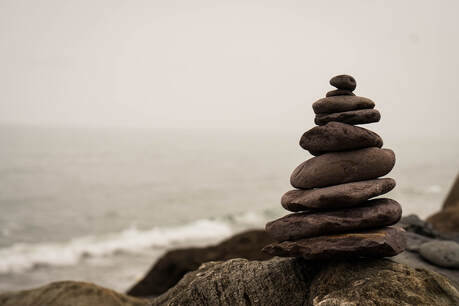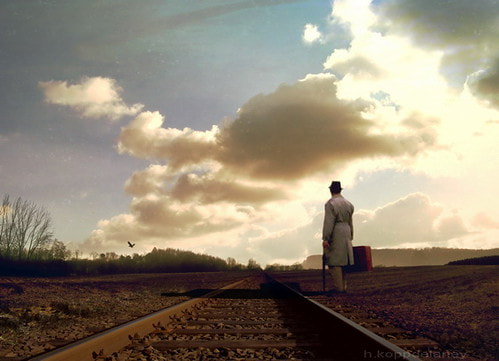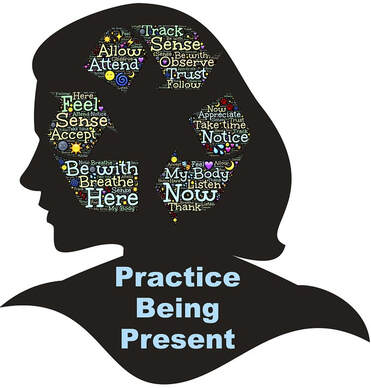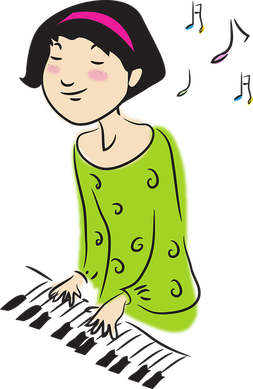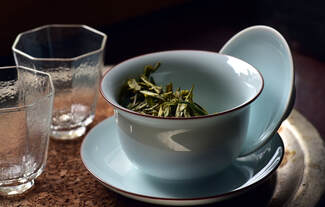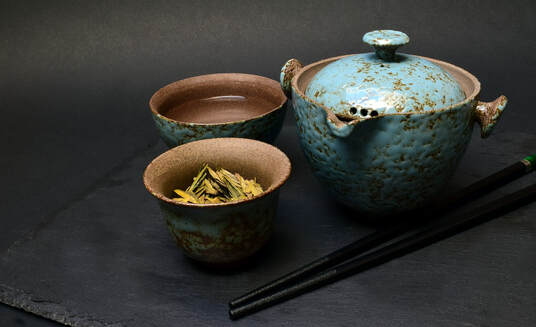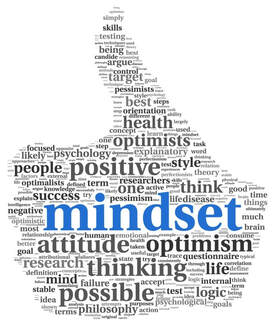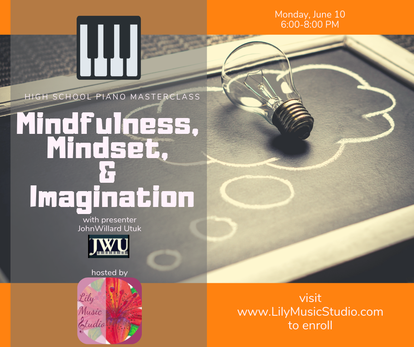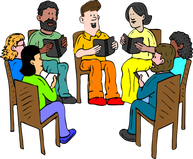|
February though April is the time of year when middle & high school bane students perform at Solo & Ensemble festival. I can look back with fond memories as an 8th grader playing my trumpet for the judge and feeling nervous but excited at the same time! Getting to choose what to play each year was fun, and I continued participating during most of high school. Now as a piano accompanist playing alongside students and coaching them with their solos, I know they can feel a bit stressed this time of year. Whether it's your first time participating, or you've played many times in a row, this post goes over what to expect and how to prepare for a positive experience as a band student or parent.  Source: Photo by Rajesh Kavasseri on Unsplash What is Solo & Ensemble?Solo & Ensemble is a non-competitive event instrumentalists (band students) participate in with the suggestion (and encouragement!) of their band director. It's a Festival where students showcase their skills by playing a piece on their own (a solo), or a piece with a group (an ensemble), in front of an adjudicator (aka judge) who assess their performance. The adjudicators are band directors from other schools or districts that comment on soloists that play their same instrument. Ensembles can be as small as a duet, or as large as a jazz band. The key element is that no one is competing against each other. Each soloist or group gets a rating based on their preparation and overall performance. So, a well presented performance would get a Superior, another that could use a bit more work would be rated as Excellent, and so forth. The rating order from ideal performance to least is Superior, Excellent, Good, Fair, and Poor/Needs Improvement. If you've come across this post, then you're probably already familiar with band-related events like football games, marching competitions, or last minute band rehearsals at school. Solo & Ensemble is organized in a similar way, with the venue ready for many students and their families to come together in one place. S & E is usually a voluntary event students do, with exceptions for additional elective classes--like jazz band, percussion ensemble, or color guard--where required participation as a potential grade is outlined by the band director. 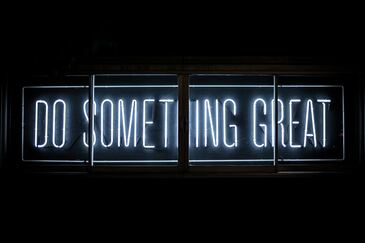 Source: Photo by Clark Tibbs on Unsplash What are the benefits of S & E? Why PArticipate?Solo & Ensemble (S & E), also called a Music Performance Assessment (MPA), has benefits for students as well as band directors. While different states and school districts have their own missions, here's an example for its purpose outlined from the Florida Bandmasters Association website: (Source: https://fba.flmusiced.org/mpa/mpa-results-and-programs/) Purpose for Band Music Performance Assessments To provide opportunities for students and directors to perform in an environment which provides critical evaluation of its performance by noted experts in the field of band performance, To provide the opportunity for students and directors to perform for their peers in a formal concert setting, To provide a performance opportunity which will serve as a motivational goal for students and directors, To provide an opportunity for students and directors to hear performances of their peers and learn from hearing those performances, and to provide a goal which is so compelling that the preparation for attaining that goal becomes the vehicle for continued growth and to demonstrate students' abilities to apply musical fundamentals and concepts in an ensemble performance setting. Reflecting back on my personal experience as a soloist (trumpet and piano) and playing in small ensembles (brass quintet, trumpet trio), here are more reasons why I think participating in S & E/MPA helps music students personally grow: Students will get to... -Perform a work in front of an audience (judge, friends/family) and receive immediate constructive feedback about their effort, preparation, practice strategies, and musicality of their performance. The judge's advice about improvement can be taken back to the band(class)room, be applied to their own playing, shared with bandmates, and help the instrument section. Performing is a form of public "speaking," which helps build confidence and the ability to adapt to new experiences. -Build independence, self accountability, and time management via learning a new piece, refining it, and getting it ready for performance. Moving through these stages is a process, and students get to experience how they manage it. -Witness the results of their practice and preparation over a set period of time. The rating symbolizes how well they've combined all their skills and suggestions from their band director(s)/private teachers into a finished "product." -Have a unique individual performing experience outside daily band rehearsals and required Fall and Spring band concerts. -Learn how to work with a piano accompanist. Students play alongside another instrumentalist while being the soloist, just like a professional musician does with an orchestra/ensemble/back up band supporting them. If working with their peers in an ensemble, students experience the "group project" aspect they'd explore in an academic class. Approached in an artistic way, students: realize how their own contribution affects the group result, learn their individual music in context with the music of the ensemble, practice teamwork, encouragement, and constructive communication with each other. They get to work with their friends to achieve a common goal: perform well and get a high rating! -Be exposed to solo literature for their instrument, become sensitive to their personal sound as a player, and learn how to create an effective musical performance using the judge's feedback. Playing solos and chamber music aside from their concert band parts opens their ears (and minds!) to different genres, eras of music, and playing technique, which is reinforced in the concert/marching band music they're already playing. -Receive a cool medal (or medals) that they can show off that reflects their achievement if they get a Superior rating! Also, getting a Superior qualifies them to perform at State Solo & Ensemble, where they can perform again, surrounded by other students from around the state that also played at an equally high level. 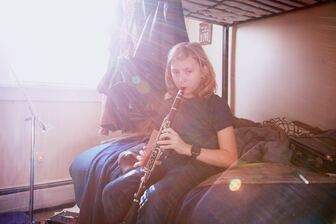 Source: Photo by Alexander Grey on Unsplash Steps for Success! Tips for StudentsStep 1: Remember this isn't a competition against others. The judge is there to encourage you on your musical journey and not criticize. S & E is an event to share how much progress you've made on your piece(s) and for developing your playing abilities. The focus is about how well you've prepared to perform and how you express yourself with your instrument. With ensembles, it's how well you all work together to create a unified sound, and compelling performance. You'll get a mini lesson after you've played, since all judges share their immediate reaction to your performance. Some will coach you through a specific passage they want to hear again, give you a playing tip, or even pull out their own instrument and demonstrate for you! (Chances are, whatever advice your band director has already mentioned in class, they'll be saying it (again!) in a new way.) Step 2: Practice your piece well ahead of time so you'll feel prepared when it comes time to perform! Usually you'll get your piece before Winter Break, or in early January. The piece is "leveled" by difficulty with a grade number. (ex: a Grade 1 piece has much easier rhythms and technique expectations than a Grade 7 piece). The sooner you work on it, the more time you can practice it! You can go through it to see how the melody flows, find challenging sections that'll need more work and notice other passages that are easier to play. Step 3: While learning and practicing your piece, watch YouTube videos and listen to recordings of performances. Seek out different versions of the piece performed by students around your age and professional musicians. Note which performances are the most expressive and accurate sounding while you follow along with the score. This way, you'll get inspiration and have a good idea of what an ideal performance sounds like. If it's early in the learning stages, you may find you don't like the piece so much...this is when you can talk to your band director and you both choose another that you'll like better. Try not to keep switching pieces last minute! Be sure you give yourself enough time to learn the music. Step 4: When watching/listening to performances, notice how the accompaniment (the pianist or orchestra playing with the soloist) sounds together with your part. Since you'll be working with an accompanist, the judge will listen to how well you both play together. If you're playing an ensemble piece, notice how the players communicate with each other through breathing cues, eye contact, and body movement. Whether it's a soloist & pianist, soloist & orchestra, or an ensemble of varied instruments, see how everyone works together to create a unified sound. Step 5: Don't be afraid to ask for help from your band director, private teacher, or accompanist while learning and practicing your music. Be open to constructive comments each will give while in the learning process. The goal is for the piece to be played musically and without much struggle. Know that it won't sound perfect at all in the beginning, and that's normal! As you continue practicing, it'll start to make more sense musically to what the piece sounds like in your ears. There will continue to be spots improve, refine, and sound better. Focus on the process, rather than how quickly you learn everything. Step 6: Practice Performing = Simulate the performance experience. Practicing performing is just like it sounds-creating the conditions and environment just like the day you'll perform. The goal is to playing through the entire piece without stopping...no going back to fix mistakes! Since the music is learned, you should be able to play through the piece with all dynamics, phrasing, correct rhythms and notes with confidence. You can record yourself with your phone, then watch it back with the score to see how well you did. You can play along with a YouTube video as your virtual accompanist. You can give a "mini-concert" and ask your family (and friends) to sit and listen to you. Afterwards, you can ask for their honest feedback to see what else needs polishing up. Step 7: Remember your Instrument, music, extra supplies, and what to wear. Number your measures for the judge. Have your accompanist's information, too! Don't forget your instrument, your music, the original music with measures numbered in pencil for the judge, and any extra supplies you might need. (extra reeds, mouthpieces, valve oil, etc.) Dressing appropriately conveys professionalism. "Stage presence" is a detail judges appreciate, and your presentation helps put attention on the music. While you really don't need to wear a suit or fancy dress, simple examples include: your school's band uniform, a button down shirt with pants, a nice dress, and avoid flip flops or jeans. Be sure you (or your parents) have your accompanists number to text, in case they're running late in other rooms helping other students. Step 8: It's OK to feel nervous. Nerves mean you care and you can turn the adrenaline into excitement! Feeling nervous is normal...even professionals (still) get "butterflies" in their stomach or sweaty palms before playing for audiences. Nerves are just your body's reaction to a new experience. One trick that may help is saying "I'm excited!" rather than "I'm feeling nervous." Just like the anticipation of going to a friends party or being strapped in for that theme park ride give you the same sensations, just turn your mindset around. Use that extra energy into playing your instrument. The judge knows students can feel that way, so take a deep breath before you begin and remember to have fun with the experience. 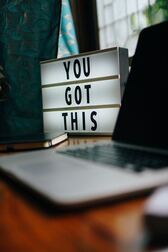 Source: Photo by Prateek Katyal on Unsplash For Parents/Caregivers:Once your child has decided to enter S & E, this list includes a few reminders for what you (and your mini musician) can expect! The festival is usually held over two days, Friday/Saturday at a local middle or high school. A month or so before, the director gives out a schedule listing the day, time, and room(s) where they'll be performing. As a parent, it helps to: 1. Be Patient. Be an encouraging/supportive "cheerleader" or "coach." Students are learning unfamiliar music for the event and this process takes a while. They likely won't sound great at it when starting out, and you'll get to listen to them practice until it gets better! So, it helps for everyone (you and your child) to remember that practicing isn't supposed to sound good, but it's working through what they don't know yet. It helps to give praise, letting your child know when you hear progress. Comment when you notice they're diligently working through the piece when it feels tough, or that they're sticking to their practice schedule consistency. The random sounds you'll hear will eventually turn into a melody you'll get stuck in your head. Another way to show support is to reserve a dedicated practice space and days/times for their practice. As a band student, they probably already have a home practice schedule. Your child will have one less thing to worry about if they know when and where they can practice at home rather than trying to do so only at school. 2. Give your piano accompanist the music well ahead of time. As accompanists, it's very important to have music in advance to practice and review. There's nothing more stressful than being given music you've never seen before without having worked with the soloist and be expected to perform in less than 24 hours! While this hasn't happened to me (thankfully), I've see last minute e-mails asking for help, when pianists need adequate time to learn their music, too! The student can get the piano part from their band director and pass it along to the accompanist, or the director can send it to the accompanist directly. For most parents, you'll have to reach out to local pianists and compare fees. The best way is to ask for help from your local music teachers association, (Google your city + music teacher's association) or ask the director if they have any recommendations. Most importantly, as soon your child gets their solo music, give the pianist the music right away, at least 2-3+ weeks before the performance date. That way there's enough time for a rehearsal or two, and the pianist doesn't have to rush to learn the music. Note: while there are some experienced pianists who can play new music easily, most accompanists won't be eager to offer their services when music is asked last minute with no rehearsal time; if one does agree, be prepared to possibly pay more since it's a use of their time and energy to perform quickly. Some schools are fortunate to have an accompanist they work with regularly that serves all the students that are participating. 3. Arrive early to give enough time to find the judge's room and allow your child to warm up. Getting to the school at least an hour early helps finding out where to go. Finding parking, checking-in, getting the school map, having time to warm up (usually in the school's cafeteria) and settle nerves are all must do's before performance time. (There's nothing more stressful than rushing to an event and not knowing what to do when you get there!) Each judge has their own (class)room, let the volunteers lead you if you're not sure. 4. Express "Congratulations" for their effort and performing! Acknowledge the band director if you see them or through email afterwards. If you listen in the hallway or sit in to watch their performance, let your child know you appreciate the work they put into preparing. Students can sometimes be harder on themselves than necessary--no matter what happens afterwards, showing your genuine support is what they'll value most. Directors appreciate feedback from parents! Whether it's a wave "hello!" in passing, or a brief chat to let them know how your child did, it helps to express how your experience was so directors can make improvements for next year. Directors will be floating around the school, checking in on their (nervous) students, and solving last minute issues. E-mail them within the week if you can't catch them! 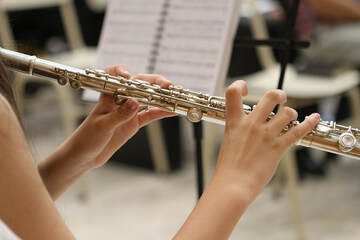 Source: Image by Brenda Geisse from Pixabay Final Thoughts:I hope this post can serve as reminders every year. Solo & Ensemble is meant to be a rewarding experience for students so they can get better at playing their instrument, learn new music, and learn skills of time management, commitment, and collaboration. With the assessment element, judges and directors both want students to have an overall positive experience, which encourages students to keep enjoying band and making music. As with most experiences, the more you participate, the easier the process becomes. Overall, S & E is a festival of music...and any opportunity to play music is a good one!
0 Comments
Flailing, Flying, or Failing?What Your Body and Imagination Have in CommonDuring my early years of piano lessons, I looked forward to playing in recitals but would always wonder where my teacher would place me in the program. It’d be a surprise to find out how long I'd have to wait! The situation was usually simple enough: all I had to do was play the one piece I’ve been working on for months... One time I performed at a women's luncheon. Mentally, my 10 year old self seemed pretty confident, yet my body wasn’t so sure. My hands shook as I moved around the keys, and my right leg bounced up and down even though I was holding down the sustain pedal. I felt awkward the whole time, but knew I had to keep playing to the end, despite struggling to keep my limbs under control. I managed to get through the piece. The audience clapped. While I heard the applause, I wouldn’t say it felt like a great performance. Mindfulness doesn’t only mean using your thoughts in a certain way. It’s also important to be aware of your body.My body has since “improved” and I don’t shake as much (or at all) when I perform. The shaky luncheon performance came from my inexperience with playing in front of audiences regularly and not understanding how I my body internally reacts to stress. How was I able to stop the shaking since that time? I’ve learned that when my body shakes, it’s because I’m nervous: physically it shows up as sweaty palms, shaking hands, legs, and shallow breathing. Mentally, my mind wanders quickly to random thoughts and isn’t “still” enough to hold onto what’s going on in front of me. There’s usually a sense of feeling unprepared and unsure. I figured that the more I perform, the more I would get used to playing in front of people...so each time my teacher asked if I wanted to play in a recital I said yes (even if I didn’t know what I’d be playing yet!). Now, I make sure I’m as prepared as I can be for any upcoming performance, which includes practicing run-throughs of pieces, and reviewing “trouble spots” to be sure I’m not worried about them in performance. If I can schedule low-stakes, mini recitals in front of family, friends, or colleagues before the “real thing” so much the better to prepare. What Does Your Body and Your Imagination have in Common?Each can tell a Story. Let’s look at what I mean: Stage presence is a thing. |
Lesson Hours
|
Connect with me on Social Media!
|

